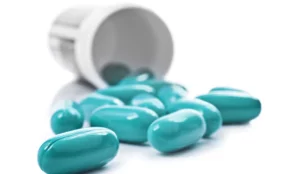Prescription Drug Detox in New Jersey
Prescription drugs serve several functions. They treat diseases, fight infections, and restore mental and physical health, thus allowing people to lead healthy lives.
However, some prescription drugs are addictive enough to lead to physical and/or physiological opioid dependence. These kinds of medications are usually controlled substances but are commonly abused, along with other types of drugs such as alcohol, meth, cocaine, etc.
At the Discovery Institute in New Jersey, our prescription drug detox center can help you or a loved one recover from drug abuse and maintain sobriety.
What are prescription drugs?
The most addictive types of prescription drugs include opiates, stimulants, and depressants. Fortunately, this kind of addiction can be treated through a professional detox process. Prescription drug detox services can manage opiate withdrawal and help people break free from substance misuse and find complete freedom.
Recognizing When Prescription Drug Abuse is Present
 Using prescription medications as instructed does not normally lead to drug dependency. But self-medicating or changing your dosages can inadvertently lead to the development of an addiction.
Using prescription medications as instructed does not normally lead to drug dependency. But self-medicating or changing your dosages can inadvertently lead to the development of an addiction.
As is the case with alcohol use, using prescription medication is not suspicious or illegal. This means it can be difficult to tell if you’ve crossed the line into addiction or not. If you are unsure whether or not you or a loved one is addicted to prescription medications, it is best to be aware of the signs of prescription drug misuse. Some signs that a person is addicted to prescription medications include:
- Doctor shopping: Going to multiple doctors to get multiple prescriptions
- Going to multiple pharmacies: Visiting more than one pharmacy in an attempt to obtain more medications
- Requesting extra refills: Asking for more medication than is recommended, requesting early refills, etc.
- Running out of medications before your next scheduled refill: Using too much and needing a refill sooner than they should
- Regularly taking more than the prescribed dose: Consuming more pills than the recommended amount
- Forging prescriptions: Producing and presenting false prescriptions to obtain prescription drugs from a pharmacy
- Misusing other people’s medications: Using a prescription medication that belongs to family or friends
- Overdose: Overdosing on prescription medications by taking higher doses than the recommended amount
- Illicit prescription drug use: Purchasing illegal pharmaceuticals online or from street sellers
If you see any of these signs in your life or the life of someone you know, it may indicate the presence of prescription drug abuse. When a person is struggling with substance abuse of any kind, it is important to get professional help immediately. So, if you are dependent on prescription drugs, now is the time to seek help from medical professionals who can help you.
The Discovery Difference: Our Technology
Self-detoxing without the help and support of medical professionals can lead to relapse. We are committed to helping our clients safely and comfortably detox from substance use at Discovery Institute. When it comes to overcoming prescription drug addiction, your physical health is our priority. That’s why we use wearable technology to monitor vitals and better understand the symptoms people are experiencing.
The initial stages of prescription drug detox and recovery can be difficult and some withdrawal symptoms can be life-threatening. But, through our wearable technology, our nursing staff can easily read vitals and quickly act when an issue occurs. If there are changes in heart rate, signs of an oncoming seizure, tremors, stress levels, or any other physical withdrawal symptoms, we can swiftly jump into action due to the monitoring of Discovery’s wearable technology!
As our wearable technology works to properly and efficiently monitor and record vitals, our medical staff can have more time to focus on treating our clients’ needs. We’re revolutionizing the field of behavioral healthcare. That’s the Discovery Difference.
Commonly Abused Prescription Drugs
Many prescription drugs are addictive and can lead to problematic use. Individuals who use these medications regularly should do so carefully. In many cases, prescription drug abuse develops accidentally. People may find themselves developing an addiction to prescription drugs completely unintentionally. Still, whether abuse begins as an accident or with intention, it is best to get help from an addiction treatment facility before the situation worsens.
Some of the most commonly abused prescription drugs are as follows:
- Central nervous system depressants: These include barbiturates, benzodiazepines, and sleep medications. A few of the well-known prescription drugs in this category include Librium, Ativan, Xanax, Valium, Ambien, Klonopin, and Lunesta.
- Central nervous system stimulants: Stimulant prescription drugs include amphetamines and methylphenidate. Brand names in this category include medications such as Concerta, Adderall, and Ritalin.
- Opioids and morphine derivatives: These prescription drugs include codeine, morphine, methadone, and more. Some of the opioid pain relievers in this category include Dilaudid, Vicodin, Darvocet, and Percocet.
Why Do I Need Medically Supervised Detox?
Prescription drug addiction is sometimes hard to recognize. Substance abuse is not nearly as black and white as we think and is generally (and rightly) treated as a disorder. However, that should not enable us to continue using; instead, it should motivate us to detox from opioids.
The reason we need detox is that Prescription drug addiction is somewhat unique from other cases. These types of opioids can be deadly and are the cause of the majority of today’s overdose-related deaths. With professional help, such as Prescription drug addiction detox, we can help you or a loved one from spiraling into a more harmful addiction, or worse, death.

Depending upon the severity of the addiction, the effects of prescription drug withdrawal become more and more serious. Should someone choose to attempt to go cold turkey and attempt to self-detox without medical supervision, it could potentially cause fatal consequences. A professional treatment center is the right choice. At Discovery Institute, our prescription drug detox center is specially focused on meeting your needs. We have medical staff available at all times to care for and treat you regardless of your situation.
CONTACT US
Find out how we can help
Our compassionate counselors are standing by to answer any questions you may have. After helping thousands of people over the last 50 years, we have the resources to help you and your family and all your individual needs.
You Are Not Alone
In the following section, we will be looking at a few statistics on substance use disorders in general as well as specifically prescription drug detox statistics. The main point of this section is to let you know you are not alone and encourage you to seek medical detox.
The counties which experience the most admissions are as follows (from greatest to least): Essex, Camden, Ocean, Monmouth, and Atlantic. The age group which had (by far) the most admissions for prescription drug use was 25-59, followed by 18-24, and finally 60 and over. Of all total drug admissions, 64% had a mental illness and were diagnosed as having a co-occurring disorder.
Finally, of those who needed treatment, the percentage of unmet needs across all of New Jersey’s counties was roughly 40%. We at the Discovery Institute want you to know that we have the most professional services available, but you need to be the ones to reach out and connect with us. We do not want you to not have your needs met. Below, we will begin to discuss the specific effects of an untreated prescription drug addiction. If you or a loved one is struggling, please consider reaching out. It is never too late.
The Effects of Untreated Prescription Drug Addiction
If opioid abuse is left untreated, major complications physical and psychological can occur. The following side effects include:
- Blackouts
- Brain damage
- Depression
- Gastroparesis
- High blood pressure
- Hyperalgesia
- Kidney damage
- Liver damage
- Lung damage
- Malnutrition
- Mood swings
- Muscle pain
- Myoclonus
- Psychosis
- Respiratory upset
Am I An Addict?
Think you may have an addiction problem? Have you ever asked yourself “am I an addict?” Discovery Institute in Marlboro, New Jersey offers various levels of care for people with mild to severe substance use issues. There is no time to wait with addiction. If you are questioning your habits regarding substance use, call us today for support.
The Importance of Medical Detox
If you or someone you know is exhibiting signs of prescription drug abuse, seeking treatment is essential. Addiction can lead to serious repercussions, both psychological and physical. Prescription drug detox can prevent this, but undergoing it alone can lead to serious medical complications and severe withdrawal symptoms. This is why professional and medically supervised detox programs are essential for recovery.
Prescription Drug Detox at Discovery Institute
 The prescription drug detox programs at Discovery Institute put the safety and comfort of our patients first. We offer medically assisted detox for patients suffering from prescription drug addiction. To begin, each patient in recovery receives a thorough examination upon admission to assess health, identify any concurrent issues, and collect a full drug use history. This information is then used to create an all-inclusive treatment plan tailored to the needs of each client.
The prescription drug detox programs at Discovery Institute put the safety and comfort of our patients first. We offer medically assisted detox for patients suffering from prescription drug addiction. To begin, each patient in recovery receives a thorough examination upon admission to assess health, identify any concurrent issues, and collect a full drug use history. This information is then used to create an all-inclusive treatment plan tailored to the needs of each client.
From that point forward, patients are administered medications to alleviate withdrawal symptoms and supervised so symptoms can be tracked and addressed when they arise. In addition to doctors and nurses, the therapeutic staff is also on call to assist with the emotional healing of the detox process.
For patients who still need prescription drugs for conditions like post-surgery pain or chronic pain management, non-addictive treatments are available so that prescription drug dependency and severe prescription drug withdrawal symptoms are reduced during detox. Addiction treatment can include traditional therapy, holistic treatments, and non-narcotic medications administered by the medical staff. For more information about our services, please contact us today.


